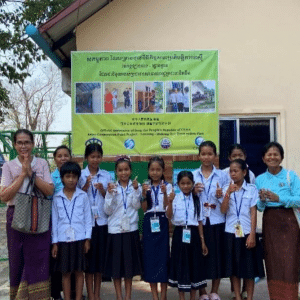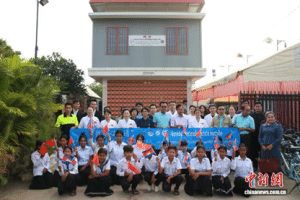China’s new Overseas NGOs Management Law went into effect on January 1st. Even though the Ministry has released a guideline on foreign NGO registration and the relevant directories, many are still unclear about the detailed rules; most notably, how to register with the police to set up representative offices and what legal procedures to follow to conduct temporary activities.
In order to answer these questions, NGOCN went to the Office of Overseas NGOs Administration of the Guangdong Provincial Public Security Bureau and consulted with a policeman there. These are the questions we asked.
Q = NGOCN
A = Policeman on duty
Q: The Ministry of Public Security has set qualification standards for overseas NGOs to operate in China. It says that an NGO has to have been in existence for a continuous period of at least two years outside of mainland China and have conducted “substantial activities” during that time. What’s the specific standard for this? How can an NGO prove they have done substantial activities?
A: The rule mainly aims to identify fraudulent organizations. That’s why we demand that NGOs have conducted substantial activities. It can’t just be some provisionally registered organizations. It has to have been in existence for more than two years.
The activities are easy to prove. It’s better to provide documents issued by relevant departments. If you don’t have that, you can notarize what you have, either by a notary institution or in front of a notary public. In some places, lawyers issue notarized documents. Different places can have different forms and procedures. These measures all conform to the provisions. There are no terribly complicated provisions.
Q: After the relevant materials are submitted, how do you review them? Are there any substantial auditing standards?
A: In accordance with the guideline, (we will) refine the Management Law (on overseas NGOs) to the best of our abilities. After the required documentation is completed, we shall decide whether to grant or refuse registration requests within 60 days of receiving an application.
As for auditing standards, you can find those in the guidelines. If we can get the picture from your submitted materials, it would be simple for us to audit. If it is overly professional, we may organize experts to review it in light of the Management Law. That would be a special case. Up until now, we haven’t encountered such a situation.
Taking the representative office as an example, you are required to submit 12 types of materials. If all of them meet the requirements and there are no objections, then you can pass. Yet, since things differ for different NGOs, if we are not familiar with the scope of operations of an NGO, we will probably need to communicate and discuss with the Professional Supervisory Unit. That’s why the unit is set up. It is created to verify the materials.
Q: Can a Chinese citizen serve as the chief representative of an overseas NGO? If the answer is yes, is the identity card the only required material?
A: Yes. Provide the identity card or a police certificate if you are a local resident.
Q: Regarding representative offices’ areas of activity, how can NGOs register with the administration if they have operations within more than one province, say Guangdong and Sichuan?
A: This depends on the will of the organization. If a large part of your business is in Guangdong and Sichuan, you can consider setting up a representative office in each province, otherwise transportation could be quite troublesome. Considering the operating costs, you can also set up one office, naming both Guangdong and Sichuan in your application form as active areas. It’s alright as long as it is in line with the real situation.
Q: Are there any overseas NGOs that have successfully set up an office?
A: Many applied, but before obtaining a certificate, they had to go through a procedure. Some organizations are well-prepared, so when they come here, they submit their materials directly. Some organizations probably don’t pay enough attention to this. We are increasing our publicity in an attempt to make it more widely known to the organizations involved.
Q: We notice that the directory for professional supervisory units has been released. How can NGOs reach out to supervisory units and get their approval?
A: Actually, a number of overseas NGOs have been in touch with their supervisory units. It’s okay if you haven’t reached out. You can go directly to their office address. They can guide you through the process of gathering required supporting materials, which is part of their public functions. But the requirements differ between professional supervisory units, so there are no universal standards in terms of getting approval.
Q: Are there any approachable supervisory units?
A: Generally speaking, departments that have been in touch with NGOs before can be more efficient and organized in terms of getting things done. If the departments’ scope of responsibility doesn’t cover much overseas service, then they will probably only be willing to get in touch with one or two NGOs instead of setting up a special office for it. For example, The Commerce Department is more organized and systematic in dealing with this. Many business associations(商协会)went to their office to get the approval letter. They have an organized workflow to handle this procedure.
Q: What if the supervisory unit is not that familiar with the field of a particular NGO and thus reluctant to become their supervisor?
A: Guangdong province has released the Professional Supervisory Units Directory of Guangdong. It’s possible that some departments that are qualified to supervise a certain business are not included in the directory because the business is relatively less well-known. If this is the case, you can inform us promptly. We’ll consider whether to include the departments in the directory through internal coordination mechanisms. We’ll give more detailed responses to specific cases.
Q: What can we do if the registration is not ratified even with the approval letter from the supervisory units?
A: I can’t answer this question in a simple way, so let me give you an example. If you have already gained approval from the supervisory units and submitted the 12 required documents, but we find out that you don’t meet some of the standards, say your organization has been in existence for less than two years, then you will not gain ratification. But after you meet all the requirements, you will be ratified.
Q: Some overseas NGOs are trying to register with the police, but it may take some time. Would it be more convenient for overseas NGOs to operate with Chinese partners and apply to conduct temporary activities?
A: Both choices have pros and cons. It’s better to set up a representative office, submit an annual plan regularly, and turn in an annual activity report at the end of a year. It’s okay if it is only temporary activity. But if it is more than one or two activities, it would be troublesome to apply again and again.
Q: What procedures should Chinese partners go through to apply for a temporary event?
A: Whether the requirement is registration or report, you will have to find Chinese partners. It can be state organs, people’s organizations, public institutions and social organizations. If the Chinese partner belongs to social organizations, then you don’t have to find another partner. Since social organizations register with the Civil Affairs Bureau, you should report to the bureau and gain approval.
Apart from that, you need to prepare documentation demonstrating the legal status of relevant overseas NGOs, such as the written agreement between you and the overseas NGO, evidence of costs and funding sources as well as your bank account details. Then scan all of these materials and upload them to the website of the Overseas NGOs Administration Office. We shall review them and give a formal reply within 10 days of receiving an application (normally it won’t take that long).
After the application is approved, you can make an appointment online for the time you submit the printed materials. As long as all the required documents are submitted, you will be able to complete your share of the task.
Q: Concerning materials that are required to apply for a temporary activity mentioned in the guideline, where should we turn to to get the materials?
A: It depends. Some are governed by the Civil Affairs Bureau and some by other departments. You seem to have registered with the Civil Affairs Bureau, so you need to get approval from them.
Q: Do consulates and UN institutions belong to the non-governmental organizations mentioned in the management law? If we partner with them or apply for funding from them, do we need to report to the relevant departments as stated in the management law?
A: There are no explicit definitions right now since political systems differ from country to country. Some organizations are government-affiliated institutions. Others are non-government-affiliated yet still receive government funding. The latter does not count as a government institution.
Q: Some consulates, like the British and Australian Consulate, provide micro-funding for grassroots NGOs. I wonder whether these fall into the scope of the Overseas NGO Management Law?
A: Our superiors have been informed of this problem and it is still under discussion. We normally suggest that they submit relevant materials, but we are still waiting for the decision of our superiors. If it is defined as an overseas NGO, we will handle the procedure according to the regulations. If not, then it is not our responsibility for now.
Q: When overseas companies or foreign-funded enterprises donate to Chinese philanthropic organizations, perhaps local educational charities, does this fall into the scope of your duties?
A: Donations are not our responsibility. This is philanthropic behaviour, which is subject to the Charity Law. The Overseas NGO Management Law deals with overseas NGOs, while foreign-funded enterprises are business organizations, so they might be subjected to the Corporate Law and the Charity Law.
Besides, it also depends on what type of funding it is. If it is a donation to local public interest organizations, then this is a source of funding for local NGOs, which is not part of our job. We deal with representative offices set up by overseas NGOs in mainland China and their activities.



